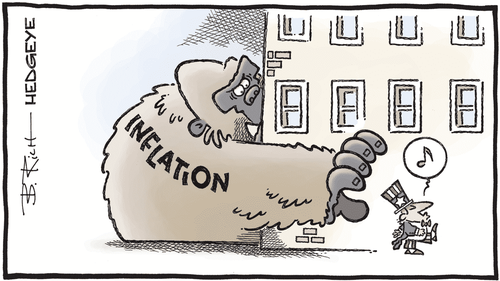Via ZeroHedge:
A Stunned Wall Street Responds To Today's Scorching Inflation Print
The biggest MoM jump in core consumer prices since 1981 and record-breaking spikes in energy and used-car prices - all much hotter than expected - has sparked some turmoil across markets as traders attempt to discern if The Fed is right in its "guessing game" that this is all "transitory".
Here’s what market participants are saying to Bloomberg:
Seema Shah, chief strategist at Principal Global Investors:
“What have we really learned today that we didn’t already know? Markets were already expecting a rise in inflation -- the big question is how sticky that inflation is. That has not been answered today, nor will it be answered for several months. Nonetheless, risk markets will continue to be whipsawed by inflationary concerns over the coming months and investors would be wise to introduce some inflation protection into their portfolios.”
Sam Stovall, chief investment strategist at CFRA Research:
“Powell does need to come out and give a confidence boost to remind investors that ‘No, we still think this is transitory and we don’t think this is going to be the beginning of a new sharply higher trend,’” Stovall said. “Maybe the Fed also says that this is going to be the high point and all subsequent readings will be on the leeward side of this CPI mountain.”
Mike Loewengart, managing director of investment strategy at E*Trade Financial:
“The markets have been hovering around all-time highs with a lot of the reopening trade already priced in. So it’s not out of the question that the outsized inflation read could bring us back down to earth a bit. Keep in mind the Fed has made it clear that it won’t let inflation increases necessarily sway it from its easy-money policies, and further any jumps like this could be transitory. So is this a trend? That remains to be seen.”
Michael Mullaney, director of global markets research at Boston Partners:
“The question remains as to if it is transitory or not, the base effect, i.e. the rebound due solely to last year’s deflation is about 70% of the number printed today. If it is not transitory, then that high of a print breaches the 3.5% limit to where P/E multiples get hit (contract). It will be good for value and bad for growth, especially if it feeds into a higher interest-rate structure.”
Willem Sels, chief investment officer of private banking and wealth management at HSBC:
“Once we have seen the peak in the base effects, Treasuries should stabilize, and this should be a positive for equities, investment-grade and high-yield corporate bonds and emerging market assets. The peak of inflation should also coincide with the bottom for technology stocks.”...
....MORE
